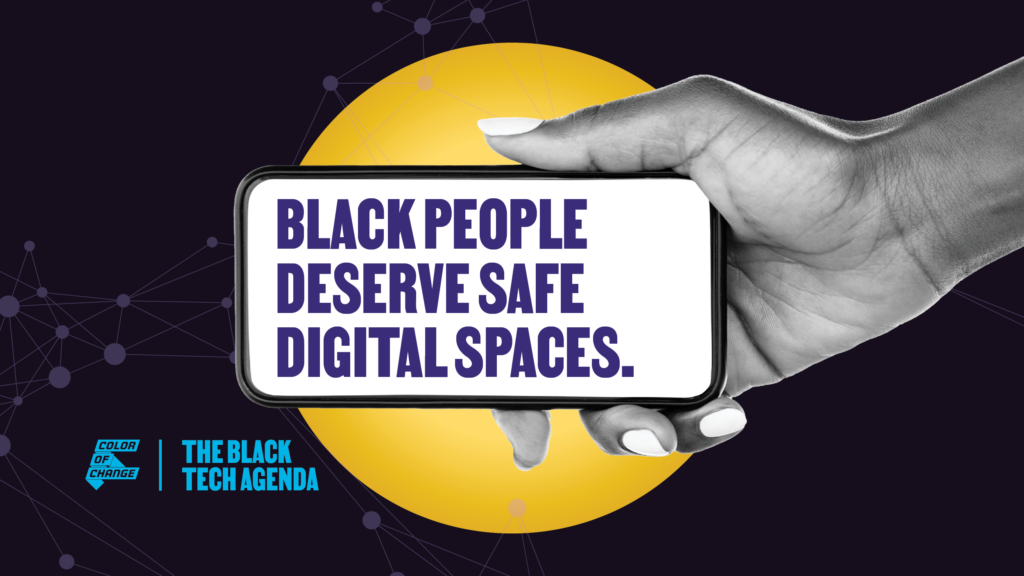Harness the Energy of Black Twitter to Demand Accountability from Big Tech

Color Of Change report
Much ink has been spilled about Twitter in the Elon Musk era. But for Black folks, it’s not just another Silicon Valley saga. The downward spiral of Twitter represents the erosion of a vibrant, sometimes even radical, community: Black Twitter.
For a decade and a half, Black Twitter served as a space where Black culture was co-created — from reacting to appointment television and experiencing new music releases to bearing witness to political milestones. Those real-time reactions — gifs, memes, slang — birthed an entirely new lexicon. We stanned our faves (and, yes, sometimes canceled them); riffed on each other’s jokes and exchanged knowing glances through our screens; bestowed flowers on legends; mourned our heroes; and amplified the powerful messages of our leaders.
As much as Black Twitter was about Black joy, it was also about organizing and mobilizing our communities to build a better world. Black Twitter spawned #BlackLives Matter, #TakeaKnee, #OscarsSoWhite, #BlackGirlMagic and #MeToo. These paradigm-shifting movements exploded because Black Twitter users understood that the power of the platform lies not in the platform itself, but in the people who build community there and leverage it for visibility.
Twitter today isn’t what it used to be. Elon Musk’s ownership has been scandalously high-profile in its dysfunction and harm. But the truth is, leadership across the tech world has consistently placed profits over people — especially Black people.
It’s time for Black folks to harness our collective power to demand accountability at Twitter and all the other social media and tech companies that profit off of Black users and creators while unleashing irreparable harm on our communities.
Imagine if we could harness the energy of Black Twitter — the movement-building, the ability to spread a message far and wide, the virality without hate and exploitation — to ensure equity and inclusion are at the center of all tech platforms and policy. At Color Of Change, our Black Tech Agenda outlines a vision for just that. It’s a comprehensive road map for protecting Black people from digital discrimination and surveillance by Big Tech and others and for advancing racial equity in tech policy.
Across six pillars, the Black Tech Agenda shows exactly how to create change and hold Big Tech accountable:
- Antitrust: Create fair markets where Black businesses can compete, Black workers can thrive and Black people have abundant options.
- Privacy and surveillance: Ban companies from using harmful practices and law enforcement from using biometric surveillance technology.
- Algorithmic discrimination: Require companies to address discrimination in their decision-making through independent audits and repair the harm that has happened.
- Broadband access: Ensure everyone has high quality, affordable internet.
- Net neutrality: Treat all internet traffic equally and designate the Federal Communications Commission (FCC) as its regulatory body.
- Disinformation and Misinformation: Change the incentives for Big Tech to profit from harm by regulating optimization algorithms and enforcing civil rights laws online.
We’ve also got our eyes on Congress, ranking lawmakers’ legislative support for reining in tech policy through the Black Tech Agenda Scorecard. While the Black Tech Agenda is supported by heavy hitters, including U.S. Sens. Cory Booker and Elizabeth Warren along with Reps. Robin Kelly and Pramila Jayapal, we need robust majorities in Congress to get onboard with our vision in order to curb the outsized power in the tech industry.
You can learn more about the Black Tech Agenda and show your support for it by clicking here.
As we look back on the heyday of Black Twitter, the memories should remind us of our collective power. Channeling what we’ve learned in a decade and a half will be essential in holding Big Tech accountable to Black communities and safeguarding our collective futures.

